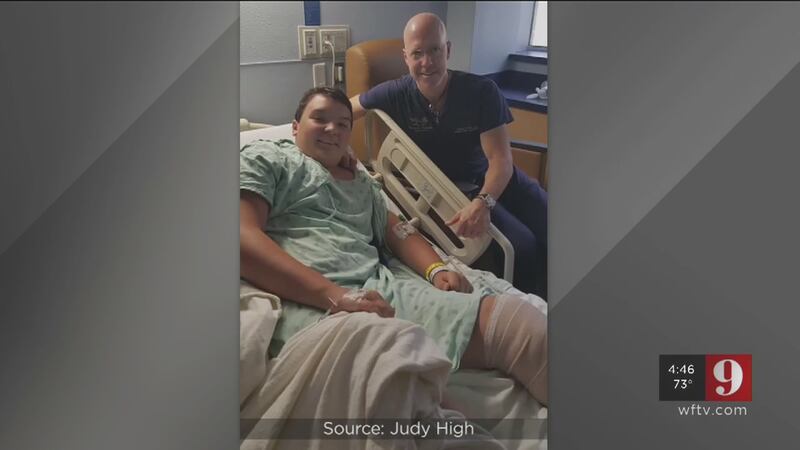COCOA BEACH, Fla. — A 15-year-old Texas boy spent much of Memorial Day weekend hospitalized after being bitten by a shark Saturday at Cocoa Beach.
Cody High said he and his family were preparing to leave the beach because of an approaching storm when he felt something grab his calf.
"We were there for about 40 minutes," he said. "I was in knee-deep water walking out the beach, and it got me from behind. My nephews and nieces were right there."
High said he thought his brother was playing a prank on him until he noticed he was bleeding.
"I noticed something like a blood trail, and I was like oh that's not a hand, that was a shark. And I looked at it, and I saw the skin flop away," he said. "And then I started realizing, like, OK, I have to calm down, so that I don't make anybody scared and panicked. And I (started) feeling the pain."
Judy High, the boy’s mother, said she immediately knew something serious had happened.
"First, I thought it was a stingray. Then whenever I saw the back of (the calf) fall off, we knew it was worst," she said. "Your next thought is bleeding to death. You're just trying to get him to the hospital."
He and his family didn’t see the animal, but lifeguards told them he was bitten by a bull shark.
Cody High was taken to Cocoa Beach’s Cape Canaveral Hospital. Once he was stabilized, he was taken to Orlando’s Arnold Palmer Hospital for Children, where he underwent surgery.
"Whenever they got in there and found that the skin was still there, then that was our other blessing that the skin was there," Judy High said. "It left some skin. It didn't hit an artery. It didn't hit a bone. Those are the three things that they were afraid (of and) that he was going to have a lot of skin grafts."
The football and baseball player said he’ll have his stitches removed in about a week.
"I'm going to have to go through physical therapy for a month or two, and if that goes well, then I might be able to still play football," he said. "But we just want to make sure I'm fully recovered before I can do anything."
George Burgess, director emeritus of the Florida Program for Shark Research at the University of Florida’s Florida Museum of Natural History, said Cody High is fortunate he wasn’t more seriously injured.
He said he believes High was bitten by a blacktip shark, because the species often frequents surf zones.
%
%%
%
"The idea that this was a bull shark is not supported by the photographs of the wounds, which resulted in above penetration injuries and some sort of scraping injuries," he said. "A bull shark that size would've taken and removed a considerable amount of flesh."
Burgess said more people visit beaches during summer months when rain reduces water visibility, causing sharks to confuse humans with prey. He said being aggressive is key to surviving a shark bite.
"You got to kick it with your other foot. Grab it from above if you can, but try not to put your hand in its mouth, because it will grab your hand as well," he said. "The main thing is to be aggressive and get out of the water. Watch over yourself. Look around to make sure you are completely safe and that there's nothing (that’s) going to make you trip."
Burgess said there were two recorded shark bites is U.S. waters during the holiday weekend, which is lower than average for such a popular weekend for visiting beaches.
Cox Media Group






